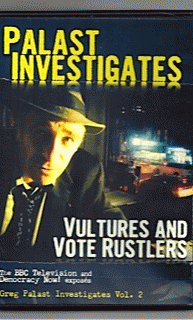in the series "Palast Investigates" and seventh DVD chronicling various aspects of the truth we must drink ourselves away from or vomit up or escape to old Disney media. . . "Vultures and Vote Rustlers" is out on the market to assail us again with life beyond our routines: Will Greg Palast's truths set us free? Is that work too hard?
Diving headfirst into volcanoes again and again, Palast offers what mainstream media withhold: facts rather than coiffeured mannequins crooning canned infotainment. Who wants to know the truth?
Here it is: The rich one percent torture us ninety-niners not with what they have, which is ours, but what we don't have, which is theirs unethically. Like vultures, they will kill us for it, and do so every day.
All reports originated as assignments for BBÇ Television, "Channel 4 DIspatches," and "Democracy Now!"
In one episode Palast stakes out at the suburban estate of "Goldfinger" Michael Francis Sheehan, king of the vulture capitalists, those who prey on impoverished developing countries by confiscating their debts for nickels and dimes and then charging the victims millions. In this scene Palast catches up with Goldfinger to ask him why he is squeezing the poor nation of Zambia for $40 million. Since the magnate is in litigation, he says, he cannot offer any answers.
Another segment spins the horrific tale of an unknown predecessor to the Deepwater Horizon disaster that killed eleven people and ruined 600 miles of Gulf coastline in 2010. The cause was poor design--the rig's drilling cement could not withstand the force of a blowout. Oil workers who later suffered imprisonment or disappearance told Palast of a similar event in Azerbaijan where the same design had allowed a similar disaster in 2009 in the Caspian Sea's oil fields. 140 workers had to flee to lifeboats to survive.
"BP concealed the information that could have saved the lives of the eleven men in the Gulf ," recounts Palast. He later reveals evidence from Wikileaks that important officials knew of the Azerbaijani disaster--the country's president knew, as did BP's partners, Chevron and Exxon. Why was nothing done? "Because BP runs the country" was the answer.
BP had armed a takeover of the government, along with the British intelligence force MI6 and the CIA, according to a double operative who worked for both BP and MI6.
On the Gulf Coast, as of the filming, 500 yards have been cleaned by laborers and another 600 miles remain; then the process must be repeated.
Also featured is the saga of the "end-game memo," a code word that appears in the title line of a classified memo written to Larry Summers by his "flunky," Tim Geithner--on the occasion of the 1997 deregulation of the U.S. banking system. A secret meeting was arranged between those two icons along with the CEOs of the five biggest banks in this country, "a conspiracy nut's wet dream."
J. P. Morgan was creating $88 trillion in derivatives, which had to go somewhere. The solution was to force 155 nations to "accept these toxic assets," to deregulate their markets via the World Trade Organization, which had received "such a warm welcome" in Seattle ten years ago.
A group of financial speculators known as Hamsa, named for the "the evil eye in an open hand," is another focus. A group of wealthy countries, including Europe, the United Kingdom, and the United States, were about to pay off the crippled developing country Liberia's national debt, as part of the debt forgiveness policy advocated by Nobel Peace Laureate Nelson Mandel, when Hamsa swooped down upon them and carried it off, now suddenly worth $28 million.
Someone had discovered an old file from the 1980s containing Liberia's debt documents and sold them to these vultures, who compounded them for astronomical profit from Liberians, 80 percent of whom who earn on average $1 a day. Another Nobel Peace laureate, Ellen Johnson Sirleaf, president of Liberia, wonders how they can live with themselves. "Have a conscience and give this country a break," she says.
And the feast goes on. Ohio's early voting Sundays are cut down from four to one, with hours also cut to four, by the benevolent Secretary of State John Husted. Scenes from a rocking African American church service in Toledo, Ohio, precede the one remaining "Souls to the Polls Day," when blacks are bussed to the polls after church services. Some of these hardworking people must encompass two to three jobs a day during the week. Signs tempt these voters to wait for Election Day, which many of them usually don't; meanwhile they are issued not paper ballots but applications for absentee ballots, a category Palast hates because of the many that are rejected--here the figure is given as one to three million--"like playing bingo with your vote." These ballots can be eliminated if even unnecessary blank spaces are not filled in. "A systematic attempt to eliminate the hard core base of the Democratic Party, and they're getting away with it . . . the new Jim Crow," according to elections attorney and professor Bob Fitrakis.
On a large blackboard in the waiting room where the thousand voters are herded are the words "early voting = "absentee voting." Not the truth.
Out of a total of eleven chapters, the first anticipates Palast's next DVD, of his latest bestseller "Billionaires and Ballot Busters," on election corruption and the marionetteers maneuvering it, all of whom happen to belong to the beloved one percent. The preview begins by anticipating Sarah Palin's inauguration as president in 2017.
(Note: You can view every article as one long page if you sign up as an Advocate Member, or higher).






